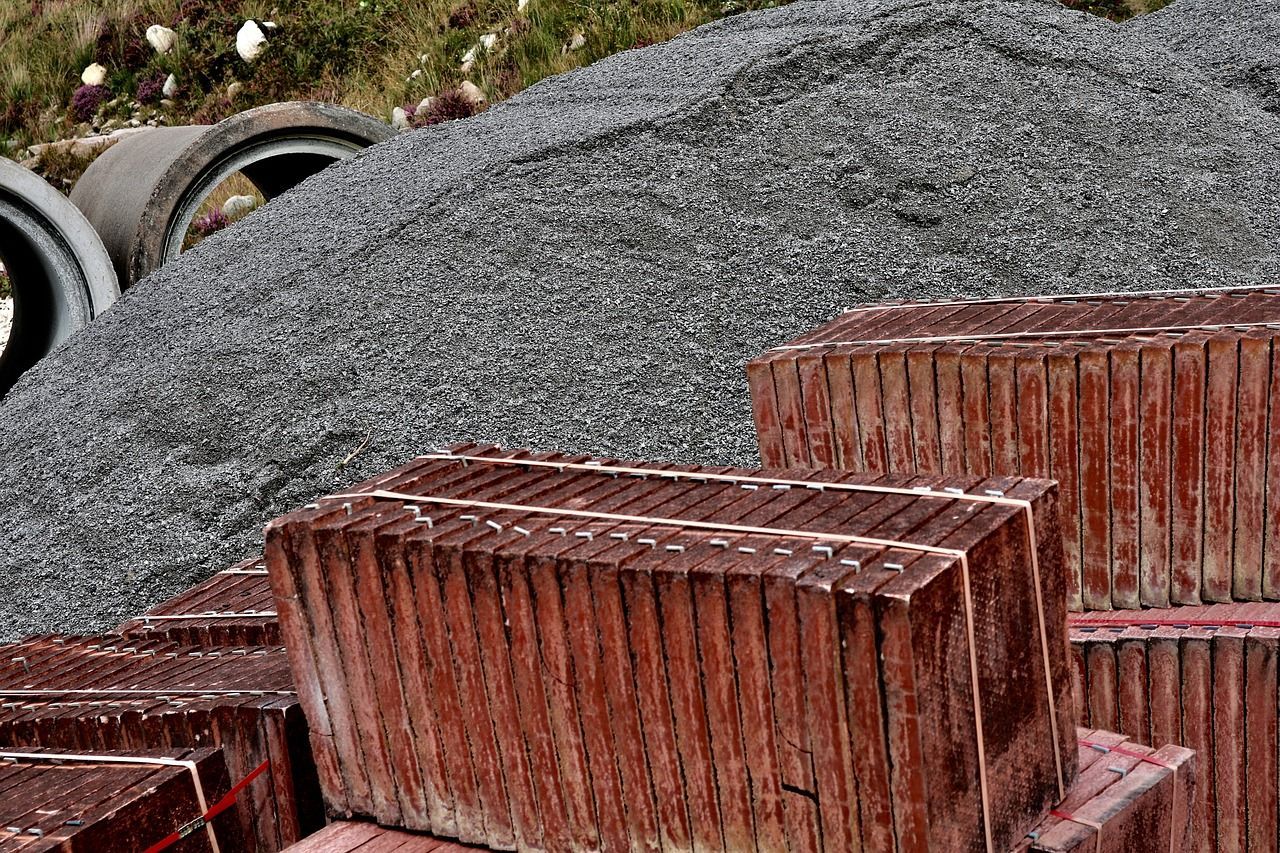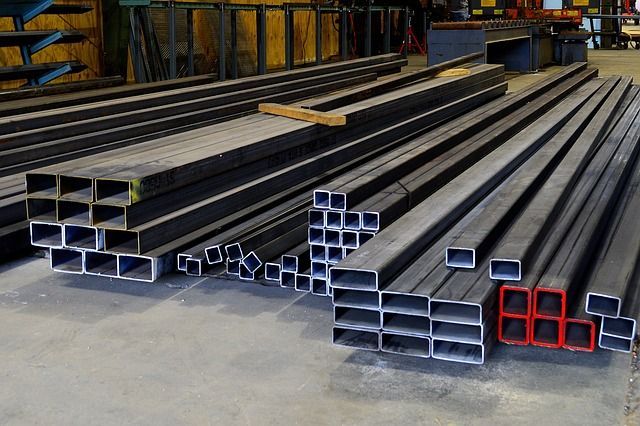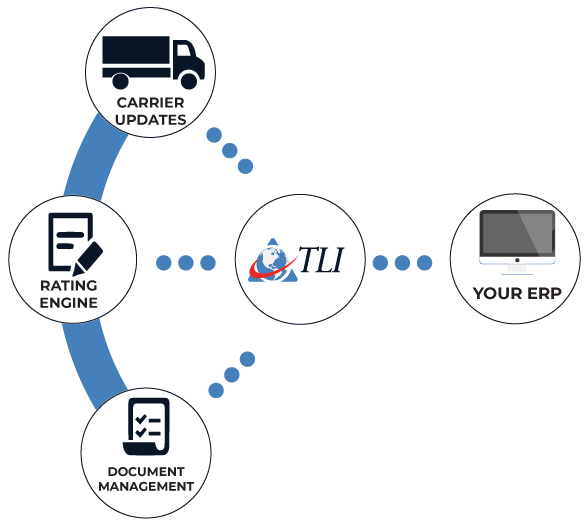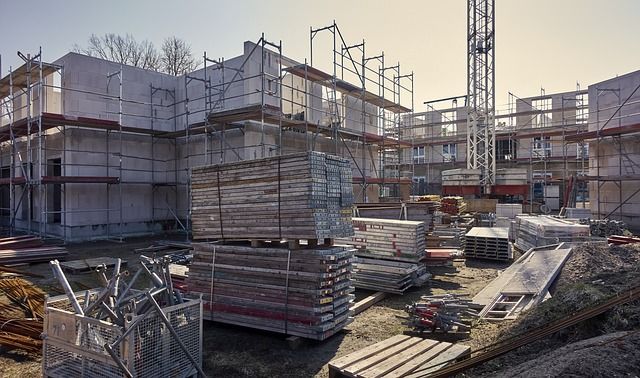What Shippers Need to Know
Construction progress relies heavily on the timely delivery of materials, as they can only build as swiftly as their available materials. Delegating logistics management to professionals like TLI enables them to focus on their construction project.
An award-winning, third-party logistics firm such as Translogistics (TLI) can collaborate with both general contractors and subcontractors to ensure the efficient and cost-effective transportation of construction materials. Various freight methods are employed, including flatbed trucks, open-top trailers, curtain side trailers, double drop trailers, and shipping containers. Flatbed trucks are preferred for transporting large or heavy items, whereas shipping containers are better suited for smaller, delicate materials. Additionally, our services encompass hot shot and gooseneck trailers for direct delivery to job sites.

Process for Initiating Freight Shipment Routing with Translogistics (TLI):
- Initial Contact:
- The project manager or contractor initiates the process by contacting Translogistics (TLI) through phone, email, or the company's TMS system.
- Contact details, including name, company affiliation, phone number, and email address, should be provided.
- Project Details Submission:
- The project manager or contractor provides quote details to TLI.
- This includes: Origin and destination zips, equipment type, and weight of the shipment.
- Nature and quantity of construction materials to be shipped.
- Desired timeframe for shipment pickup and delivery.
- Any specific requirements or preferences regarding shipping methods, modes of transport, or handling instructions.
- Consultation and Assessment:
- TLI assigns a dedicated logistics sales specialist to the project.
- The specialist conducts a thorough consultation with the project manager or contractor to understand their specific needs, constraints, and preferences.
- Detailed assessment of the project requirements is performed to determine the most efficient and cost-effective shipping solutions.
- Proposal and Agreement:
- Based on the consultation and assessment, TLI prepares a comprehensive proposal outlining the recommended shipping solutions, including: Preferred modes of freight (e.g., flatbed trucks, open-top trailers, shipping containers).
- Estimated costs, including transportation fees and any additional services required (e.g., cargo insurance, specialized handling).
- Proposed timeline for shipment pickup and delivery.
- The project manager or contractor reviews the proposal and discusses any necessary modifications or clarifications with the TLI specialist.
- Upon agreement on the proposed terms, a formal agreement or contract is drafted and signed by both parties.
- Execution and Coordination:
- Once the agreement is finalized, TLI takes charge of coordinating the logistics and execution of the freight shipment.
- This includes scheduling pickup of construction materials, arranging transportation, managing documentation and permits, and overseeing the entire shipping process from start to finish.
- Regular communication and tracking updates are provided to the project manager or contractor throughout the shipment process.
- Delivery and Follow-up:
- TLI ensures timely delivery of the construction materials to the designated destination.
- Upon completion of the shipment, TLI conducts a follow-up with the project manager or contractor to confirm successful delivery and address any post-delivery concerns or feedback.
- Feedback from the project manager or contractor is valuable for continuous improvement of TLI's services.
- Post-Project Evaluation:
- TLI sales support conducts a post-project evaluation to assess the overall performance, efficiency, and customer satisfaction.
- Lessons learned and feedback are incorporated to refine and enhance future freight shipping processes and services.

Construction Industry Shipping Perspective
In growing cities across America, the construction industry is facing significant challenges to meet the growing demand for new housing. The intricacies of construction logistics become apparent in this context.
For instance, delays in the delivery of supplies can cascade into delays in construction activities, impacting essential elements such as plumbing, power, and permits. Consequently, project timelines are extended, leading to decreased profits. The supply chain involved in construction is intricate but also engrossing.
Consider the myriad components required for the construction of homes, a process often taken for granted. From foundational materials like concrete forms, rebar, and tubing to interior finishes such as drywall, flooring, cabinets, and shelving, every element must be transported to the job site efficiently and effectively.

Construction Materials to Ship
Masonry
Preferences vary: from red brick to native stone, or wood siding to stucco. Residential exteriors display regional diversity, sourcing materials locally or across broader geographies.
In the realm of construction, skilled masons are indispensable to general contractors (GCs). Their expertise spans from erecting block foundation walls to crafting fireplaces.
These professionals adeptly handle the installation of stone and brick veneers, glass blocks, and granite. Transporting these bulky materials safely to job sites is paramount. While masonry materials are generally resilient, proper storage and protection, including during transit, are imperative to uphold their integrity.
Stone Slabs
The first shipment, I ever booked in operations at TLI, over 14 years ago, was routing granite countertops within the LTL environment. Granite, quartz, marble countertops, and tiles are not only timeless, beautiful, and durable but also notably heavy and challenging to transport. They represent a significant investment.
When multiplied across multiple units or houses, managing the transportation of these exquisite yet delicate materials becomes a logistical feat. Skilled carriers possess the expertise to properly load, secure, and ship stone slabs, ensuring they arrive intact without cracks, breaks, or scratches.
Ensure the protection of your valuable investment from the outset by entrusting the shipping process to TLI. Our carriers are renowned for their professionalism and expertise, guaranteeing the safe delivery of your natural stone slabs.
Structure
For townhomes, condominiums, or single-family houses, various materials contribute to the structure. Traditionally, softwood lumber has been the go-to choice for house framing, encompassing studs, headers, roof trusses, and floor joists.
Innovations in construction materials have introduced options like engineered wood and steel bars and connectors into new residential construction projects. These materials provide sturdy support vertically, while large plywood sheets bolster the side-to-side structure of the home. Additional considerations during the framing stage include stairwells, windows, and roofing components. Given that structural materials are often lengthy, heavy, and cumbersome, they may necessitate special shipping arrangements. When planning to ship construction materials from suppliers, it's wise to consult with TLI's logistics professionals for guidance on navigating the process efficiently.
Plumbing
If you reside in an average single-family home, your considerations might lean towards a smaller scale: envisioning one or two toilets, tubs, and showers, along with three or four sinks, encompassing the kitchen.
However, broaden your perspective to the broader context of new neighborhoods, typically developed as master-planned communities by a handful of national builders simultaneously, offering a limited array of floor plans and interior and exterior choices. This approach allows for bulk planning and construction, enhancing efficiency and cost effectiveness.
Suddenly, the procurement of fixtures transcends the acquisition of a few standardized items; it entails purchasing thousands of fixtures destined for hundreds of homes. This principle equally applies to commercial real-estate and apartment and condominium complexes.
Landscaping
A hallmark of contemporary residential communities lies in their array of amenities. From meticulously planned neighborhoods to newly developed apartment or condominium complexes, these spaces often boast recreational facilities such as parks, pools, community hubs, and nature trails. Adding to their allure is the carefully crafted landscaping. Landscape architects and designers play a pivotal role in creating outdoor environments that seamlessly blend functionality with aesthetic appeal. Many modern projects emphasize communal green spaces, fostering opportunities for residents to connect with nature or gather for communal events.
Contractors oversee the procurement and installation of various elements, including bulky and climate-sensitive items like sod, plants, and trees. Specialized shipping methods, such as reefer equipment for temperature-controlled plants and flatbeds for transporting large plants and trees, are employed to ensure safe and intact delivery to the designated sites.
Appliances
Consider the final touches and modern conveniences of a newly constructed home: appliances. Visualize the multitude of washing machines, dryers, and dishwashers required for every newly developed community. With rental properties, a substantial number of identical items sourced from the same manufacturer are delivered in rapid succession.
Managing the logistics of this magnitude of a project is made easy when partnered with TLI. However, until these details are meticulously attended to, building managers cannot lease out units, and property owners cannot generate revenue. Ensure the seamless arrival of your order, free from damage. With our extensive network of trusted carriers, Translogistics Inc. (TLI) provides prompt and reliable delivery. In the rare event of cargo damage, rest assured that TLI will handle the freight claim process on your behalf. We'll have you operational in no time.
Can my Shipments be Integrated into my ERP?

TLI frequently receives inquiries about its ability to seamlessly integrate carrier rates into Enterprise Resource Planning (ERP) systems. Having real-time access to carrier rates within your ERP enables informed decision-making, leading to more cost-effective and efficient transportation management.
ViewPoint TMS supports your supply chain strategies, ensuring that every freight decision aligns with operational excellence and budgetary considerations.
Moreover, TLI's integration solution extends beyond mere rate incorporation, providing significant enhancements in data management and invoice accountability.
This integration facilitates comprehensive audits of freight bills, ensuring accuracy and transparency in financial transactions. With this advanced capability, businesses can monitor and optimize shipping costs more effectively, identifying potential areas for savings and ensuring adherence to predetermined rates with each transaction.
FAQ: Shipping Construction Materials
What types of construction materials can be shipped via freight?
Construction materials eligible for freight shipment encompass a wide range, including lumber, steel beams, cement bags, plastic articles, bricks, tiles, roofing materials, drywall, steel articles, insulation, pipes, and various other bulk or heavy items integral to construction projects.
What are the common modes of freight used for shipping construction materials?
The prevalent modes of freight utilized for shipping construction materials are flatbed trucks, open-top trailers, and shipping containers. Flatbed trucks are suited for transporting large, heavy, or oversized items, whereas shipping containers are optimal for smaller, more delicate materials. TLI also utilizes goosenecks for smaller freight arriving directly to the jobsites.
Are there any restrictions on shipping certain construction materials?
Yes, certain construction materials may be subject to shipping restrictions due to safety or regulatory concerns. For instance, shipping hazardous materials may necessitate special handling and documentation, TLI can route hazmat freight but we need to know the details on the front end at the time of quoting. It is essential for TLI to operate in compliance with relevant laws and regulations before initiating your shipment.
How can I optimize freight shipping for my construction business?
To optimize freight shipping operations for your construction business, consider strategies such as consolidating shipments to reduce costs, negotiating project rates with TLI based on shipping volume, and implementing efficient packaging and loading procedures. Leveraging TLI's freight management software can also facilitate streamlined operations and effective shipment tracking.
Discuss your Project
Translogistics is a distinguished frontrunner, boasting an extensive carrier network, state-of-the-art technology, and a team of seasoned logistics professionals. With a +30-year legacy grounded in trust, loyalty, and integrity—rare qualities in the transportation sector—the company has solidified its reputation.
Moving forward, TLI's shipping solutions remain focused on providing innovative solutions that enhance shippers' supply chains, decrease costs, and foster growth. If you've explored other options, now is the time to collaborate with the best freight brokerage in the industry.

